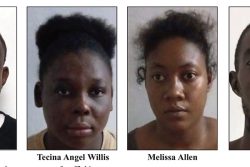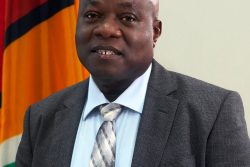SANTA MARTA, Colombia, (Reuters) – Colombian Presi-dent Juan Manuel Santos and Venezuela’s Hugo Chavez restored diplomatic ties yesterday at talks to end the latest dispute between the ideologically opposed Andean neighbours.
Cross-border tensions have run high for more than a year with the socialist Chavez imposing what Colombia called a trade embargo and cutting ties completely last month.
Yet both leaders came to the colonial city of Santa Marta in a reconciliatory mood, and said ties had been restored in a statement read after their meeting.
“We have had a frank, direct, sincere dialogue like in all good relations. We have taken a huge step forward in restoring confidence,” Santos said, adding Venezuela had agreed to pay debts owed to Colombian exporters. That debt is estimated at about $800 million.
“I came here to turn over the page,” Chavez said. The pair shook hands and stood under a statue of South American independence hero Simon Bolivar.
At the heart of the latest dispute were Bogota’s allegations that Chavez, a left-wing foe of the United States, harbors Colombian guerrillas, and Venezuelan complaints about a Colombian deal to allow U.S. troops more access to its military bases.
Those issues and ideological differences remain difficult to resolve in the short term, but both leaders will benefit from any move to restore $7 billion a year in bilateral trade as they seek to spur economic recovery.
On his arrival, Chavez declared his affection for Colombia in a brief speech quoting Bolivar and Colom-bian author Gabriel Garcia Marquez. He marched with Santos past Colombian troops and to a monument on the site of Bolivar’s former colonial home.
Santos, a U.S.- and British-educated economist elected in June, has clashed before with Chavez, a Cuba ally who says his homespun revolution in Venezuela is inspired by Bolivar.
Santa Marta, a port town on the Caribbean sea, was where the Venezuelan-born Bolivar died after his long fight to free the region from Spanish rule. Chavez has met several Colombian leaders there in the past.
Santos, who took office on Saturday, has appeared to take a more pragmatic approach to relations with Venezuela. Chavez would also benefit from better trade ties to boost his popularity before legislative elections in September.
Venezuela would gain cheap food imports from Colombia as it tries to control high inflation, and Colombia would restore some trade with its traditional No. 2 commercial partner.
“Deeper differences between the two governments, including over ideology and attitudes to the United States, will not simply disappear,” said analyst Christian Voelkel with IHS Global Insights risk consultants.
“Traditionally high volatility of relations could gradually decrease.”
News of the meeting and possibilities that trade could be restored helped push up Colombia’s peso currency in trading on Monday, the day after the talks were announced by the foreign ministers of both governments.
Colombia’s long guerrilla conflict has often spilled over the Venezuelan border, where kidnappings and drug trafficking are common. Chavez has complained that Colombia’s military is not doing enough to secure the frontier.
But Chavez’s ideological affinity with Colombia’s Marxist FARC rebels has led Washington and Bogota to accuse him of supporting the guerrillas. The former paratrooper dismisses the charges as U.S.-backed propaganda.
Andean tensions have run high since 2008 when Colombian troops attacked a FARC rebel base hidden over the border in Ecuador. Quito and Caracas warned of war and sent troops to the border area before a regional summit defused tensions.
The most recent squabbling came after Colombia signed a deal giving U.S. troops more access to its bases for anti-narcotics and counterinsurgency efforts. Chavez accused Bogota of working with Washington to undermine his government.
Chavez broke off ties again with Colombia last month after then-President Alvaro Uribe accused him of harboring more than 1,000 leftist Colombian FARC rebels on his territory.









